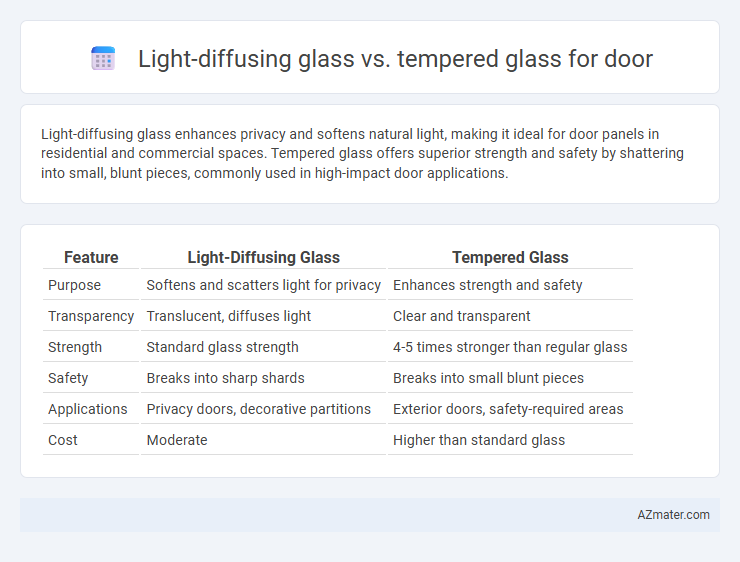Light-diffusing glass enhances privacy and softens natural light, making it ideal for door panels in residential and commercial spaces. Tempered glass offers superior strength and safety by shattering into small, blunt pieces, commonly used in high-impact door applications.
Table of Comparison
| Feature | Light-Diffusing Glass | Tempered Glass |
|---|---|---|
| Purpose | Softens and scatters light for privacy | Enhances strength and safety |
| Transparency | Translucent, diffuses light | Clear and transparent |
| Strength | Standard glass strength | 4-5 times stronger than regular glass |
| Safety | Breaks into sharp shards | Breaks into small blunt pieces |
| Applications | Privacy doors, decorative partitions | Exterior doors, safety-required areas |
| Cost | Moderate | Higher than standard glass |
Introduction to Glass Options for Doors
Light-diffusing glass enhances privacy and aesthetics by scattering light evenly, reducing glare while maintaining natural illumination in door panels. Tempered glass offers superior strength and safety, shattering into small, blunt pieces upon impact to prevent injury, making it ideal for high-traffic or security-focused doors. Selecting between these options depends on balancing privacy needs, safety requirements, and design preferences for residential or commercial door installations.
What Is Light-Diffusing Glass?
Light-diffusing glass is engineered with microstructures or coatings that scatter incoming light, creating a soft, evenly distributed illumination while maintaining privacy and reducing glare. This type of glass is ideal for door applications where natural light transmission is desired without compromising on obscurity. Unlike tempered glass, which is primarily designed for strength and safety, light-diffusing glass optimizes light quality and visual comfort.
What Is Tempered Glass?
Tempered glass is a type of safety glass processed by controlled thermal or chemical treatments to increase its strength compared to standard glass. When broken, tempered glass shatters into small, blunt pieces, reducing the risk of injury, making it ideal for doors requiring durability and safety. In contrast, light-diffusing glass prioritizes privacy and even light distribution but lacks the impact resistance and safety features inherent in tempered glass.
Key Differences: Light-Diffusing vs Tempered Glass
Light-diffusing glass scatters incoming light to reduce glare and enhance privacy while allowing natural illumination, making it ideal for door panels where diffused light is preferred. Tempered glass is heat-treated for increased strength and safety, designed to shatter into small, less harmful pieces upon impact, commonly used in doors requiring high durability and security. The key difference lies in their functions: light-diffusing glass optimizes light quality and privacy, whereas tempered glass prioritizes strength and safety.
Light Transmission and Privacy Comparison
Light-diffusing glass offers high light transmission by scattering natural light evenly, enhancing privacy without compromising brightness, ideal for doors requiring both illumination and seclusion. Tempered glass features excellent strength and safety but transmits light clearly, providing less privacy unless combined with additional treatments like frosting or films. Choosing between the two depends on balancing priorities for natural light diffusion and visual privacy in door applications.
Safety Features and Durability
Light-diffusing glass enhances safety by obscuring vision, reducing the risk of break-ins and protecting privacy, while maintaining adequate illumination. Tempered glass offers superior durability through heat treatment, providing high resistance to impact and shattering into small, blunt pieces that minimize injury hazards. Both materials contribute to door safety, but tempered glass excels in impact strength, whereas light-diffusing glass prioritizes privacy and controlled light transmission.
Aesthetic Appeal and Design Flexibility
Light-diffusing glass offers a soft, matte finish that enhances privacy while creating a stylish, modern ambiance with evenly scattered light. Tempered glass provides a sleek, clear surface known for its strength and safety, allowing for bold, transparent designs that showcase interior spaces. Choosing between these materials depends on the desired balance between luminous softness and high-clarity visibility in door applications.
Energy Efficiency and UV Protection
Light-diffusing glass enhances energy efficiency by evenly distributing natural light, reducing the need for artificial lighting and minimizing heat gain through diffusion, while offering superior UV protection that helps prevent interior fading and damage. Tempered glass provides strong durability and safety but typically allows more direct sunlight penetration, which may increase heat transfer and UV exposure without additional coatings. Choosing light-diffusing glass for doors improves thermal regulation and UV blockage, contributing to lower energy consumption and better protection for interior furnishings.
Cost Considerations and Installation
Light-diffusing glass for doors generally comes with higher material costs due to its specialized manufacturing process that enhances natural lighting while maintaining privacy. Tempered glass tends to be more affordable and widely available, offering superior strength and safety benefits with relatively straightforward installation requirements. Installation of light-diffusing glass may require skilled labor to ensure proper sealing and positioning to maximize its light-scattering properties, whereas tempered glass installation is typically faster and less complex, reducing labor costs overall.
Choosing the Best Glass Type for Your Door
Light-diffusing glass enhances privacy by scattering light to obscure visibility while allowing natural illumination, making it ideal for doors where both brightness and discretion are priorities. Tempered glass offers superior strength and safety, shattering into small, blunt pieces upon impact, which is perfect for high-traffic or security-sensitive door applications. Choosing the best glass type depends on balancing privacy, safety requirements, and aesthetic preferences to suit the specific door location and usage.

Infographic: Light-diffusing glass vs Tempered glass for Door
 azmater.com
azmater.com